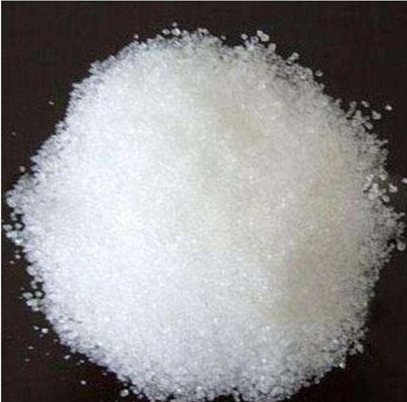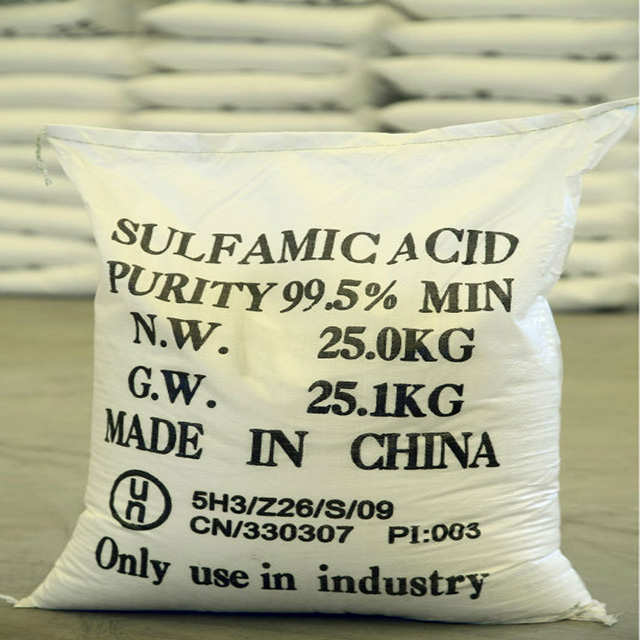What is Sulfamic Acid?
Sulfamic acid also calld as amido sulfuric acid is a white crysallie solid which is non-hygroscopic and stable. It is soluble in formamide and water, and slightly soluble in concentrated sulfuric acid, methanol, acetone, and ether. It is commercially produced from fuming sulfuric acid and urea, and classified as a strong inorganic acid. The sulfamic acid with dilute aqueous solution is stable for longer periods at room temperature. However, a rapid hydrolysis arises at high temperatures. The sulfamic acid is considered as less corrosive to metals compared to other strong acid such as hydrochloric acid. As the sulfamic acid retains a scale solubilizing capacity it is considered ideal for removal of scale from cooling towers, boilers, coils, condensers, heat exchangers and a wide range of cooling and heating systems thereby amassing the efficiency of equipment and plant.
Sulfamic acid is a safe and powerful acid, which is suitable for descaling applications and acid cleaning. One of the most common use of sulfamic acid is for descaling heating coils and heated vessels in the food handling premises owing to its ability to quickly dissolve hardness deposits without objectionable odors or fumes. Hence, sulfamic acid is considered as the most popular, safe, preferred acid in various industries.


What is the solubility of Sulfamic Acid?
Sulfamic Acid moderately soluble in DMF and slightly soluble in MeOH .Sulfamic Acid Insoluble in hydrocarbons.
What is the Sulfamic Acid used for?
As sulfamic acid is superefficient agent for descaling, it is used for cleaning a number of domestic appliances and industrial equipment. It is used for cleaning heat exchangers, boilers, condensers, descaling toilets, jackets and coils, eflorescence other deposits of mineral deposits, removing excess grout on tiles, etc. It helps remove protein deposits, hard water scale, beer and milk stone, copper corrosion, and light rust. Some other uses of sulfamic acids are listed below.
Descaler, rust remover, and eaner.
Descaler and cleaner for dairy equipment such as milk evaporators, milkers' pipeline.
Descaler and cleaner for brewery equipment such as vats, pipelines,
Catalyst for esterification process.
Used in dye & pigment manufacturing
Used as an herbicide.
Effective against foot and mouth.
Used as an ingredient in denture tablets.
Ingredient in fire extinguishing media.
Urea-formaldehyde resins coagulator
Synthesis of nitrous oxide by reaction with nitric acid.
Chloride stabllizer in pulp & paper industry.
Other uses
Catalyst for esterification process
Dye and pigment manufacturing
Herbicide
Descalant for scale removal
Coagulator for urea-formaldehyde resins
Ingredient in fire extinguishing media. Sulfamic acid is the main raw material for ammonium sulfamate which is a widely used herbicide and fire retardant material for household products.
Pulp and paper industry as a chloride stabilizer
Synthesis of nitrous oxide by reaction with nitric acid
The deprotonated form (sulfamate) is a common counterion for nickel(II) in electroplating.
Used to separate nitrite ions from mixture of nitrite and nitrate ions( NO3−+ NO2−) during qualitative analysis of nitrate by Brown Ring test.
Sulfamic Acid as a Cleaning Agent
As per Research Dive analyst review, sulfamic acid is used as an acidic cleaning agent, usually for ceramics and metals. Over the last few years sulfamic acid has replaced hydrochloric acid as a remover of the rust. In homes, it is frequently found as a descaling agent in toilet cleaners, and detergents for the removing the lime scale. When compared to other strong and most common strong mineral acids, the sulfamic acid has the needed low toxicity, low volatility, and water descaling properties. It forms water- soluble salts of ferric iron and calcium. Sulfamic acid provides intrinsic safety and hence it is preferred over hydrochloric acid for household use. Unlike the most common acids, the sulfamic acid does not form chlorine gas if invalidly mixed with hypochlorite based products.
Industrial Applications of Sulfamic Acid
The sulfamates have been used in the design of various types of therapeutic agents such as nucleotide/nucleoside HIV, antibiotics, HIV protease inhibitors (PIs), weight loss drugs, antiepileptic drugs, and anticancer drugs. Sulfamic acid is also used as a chlorine stabilizer in cooling towers and swimming pools. The industrial applications of sulfamic acid are as follows:
Paper & pulp Industry
Sulfamic Acid inhibits pulp degradation due to temperature at the hydrochloride and chlorination stage. It allows bleaching at elevated temperature and lower pH without any lIoss in strength.
Dyes & Pigments Industry
Sulfamic acid takes out excess of nitrides that are used in the diazotization reactions during the manufacturing of pigments and dye stuffs. The sulfamic acid can also remove ntrides if present in process water of emissions.
How is Sulfamic Acid produced?
Sulfamic acid is produced industrially by treating urea with a mixture of sulfur trioxide and sulfuric acid (or oleum). The conversion is carried out in two stages:
OC(NH2)2 + SO3 → OC(NH2)(NHSO3H)
OC(NH2)(NHSO3H) + H2SO4 → CO2 + 2H3NSO3
What is the storage condition for Sulfamic Acid?
Sulfamic Acid store in Corrosive Area with other corrosive items. Store in a dedicated corrosive cabinet.
Sulfamic Acid store in a cool, dry, well-ventilated, locked store room away from incompatible materials.



What is the preparation procedure for Sulphamic Acid?
Sulphamic Acid should always be added to water, never add water to sulfamic acid.
At room temperature, diluted aqueous Sulphamic Acid is stable for a long period of time but hydrolysis occurs at elevated temperatures.
Concentrated sulfamic acid can be corrosive and can cause burns on the skin when it is not properly handled. This chemical is unique because it not only causes chemical burns, but also secondary thermal burns as a result of dehydration. It is vital to use proper PPE such as Rubber gloves, full clothing, rubber apron, and eye and face protection when mixing to avoid contact with unprotected skin. Contaminated clothing should be washed before being used again.
Where to buy Sulfamic Acid?
Here at QIDI Chem we have Sulfamic Acid for sale. We export worldwide, so you can contact us for a FREE quotation via email address arvin@czqidi.com or send a message on WhatsApp for a fast response at +86-139-1500-4413.If you don't want to address email, click the QI DI chem for more information about the product.
English
العربية
Français
Русский
Español
Português
Deutsch
italiano
日本語
한국어
Nederlands
Tiếng Việt
ไทย
Polski
Türkçe
አማርኛ
ភាសាខ្មែរ
Bahasa Melayu
ဗမာစာ
Filipino
Bahasa Indonesia
magyar
Română
Čeština
қазақ
हिन्दी
فارسی
Kiswahili
Slovenčina
Slovenščina
Norsk
Svenska
українська
Ελληνικά
Suomi
עברית
Latine
Dansk
اردو
বাংলা
Hrvatski
Afrikaans
Eesti keel
සිංහල
latviešu
Български
Hausa
íslenska
Kurdî
Lietuvių
isiZulu











